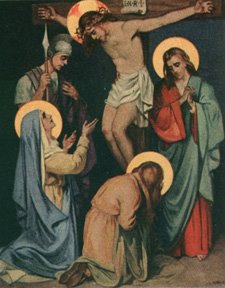This post is from years ago but it hits me where I live even now. Some of the liturgy quoted may not relate to this year because it is older, but it is all close enough.
... we gather together to herald with the whole Church
the beginning of the celebration
of our Lord's Paschal Mystery,
that is to say, of his Passion and Resurrection.
Palm Sunday, Commemoration of the Lord's Entrance Into Jerusalem
In his commentary on this portion of the Mass last year, our priest pointed out that the Triduum is one extended liturgy.
For the first time I understood why we read the entire passion and crucifixion during
Palm Sunday's liturgy. It is to give us a preview of what we are to be meditating on during this week. It is to give us a chance to enter fully into that journey Jesus is taking which culminates with his Passion, Crucifixion, and Resurrection. It is to give us the chance to accompany him not just as a spectator, but as a friend.
Let us put aside our differences. It changes nothing. It is fruitless self preoccupation. It distracts and divides us at a time when we should be focusing on Jesus. I thought of those squabbles when I heard this part of the gospel:
His disciples realized what was about to happen, and they asked,
“Lord, shall we strike with a sword?”
And one of them struck the high priest’s servant
and cut off his right ear.
But Jesus said in reply,
“Stop, no more of this!”
Then he touched the servant’s ear and healed him.
Let us "Stop, no more of this" as we concentrate on what matters most now.
Christ Jesus, though he was in the form of God,
did not regard equality with God
something to be grasped.
Rather, he emptied himself,
taking the form of a slave,
coming in human likeness;
and found human in appearance,
he humbled himself,
becoming obedient to the point of death,
even death on a cross.
Because of this, God greatly exalted him
and bestowed on him the name
which is above every name,
that at the name of Jesus
every knee should bend,
of those in heaven and on earth and under the earth,
and every tongue confess that
Jesus Christ is Lord,
to the glory of God the Father.
This year, our priest had a three sentence homily and it hit the nail on the head. When talking to his spiritual advisor about troubles and trials, he was told, "You are having these problems because you are avoiding the Cross."
Aren't we all? For my own part, I faced a severe internal struggle last week. Then God in his goodness made me understand that I was causing my own turmoil because I was trying to squirm out of the Cross.
Ah yes.
At that point I gave up wanting my way. And I was able, with St. Josemaria Escriva, to say, "Is that what you want? Then I want it too." that I regained peace and calm. I still had to face the Cross, but it was not so big a cross as the one I was creating for myself.
This is why I need Lent every year. I forget this lesson so easily. And life is so much simpler when I live without avoiding the Cross. Let's face it ... I'd face that Cross anyway. But when I do it squirming and turning away it is so much more difficult than when I slip my hand in God's and follow my Savior's example.
Let us walk with him this week.
 |
Les Très Riches Heures du duc de Berry,
Folio 173v - The Entry into Jerusalem the Musée Condé, Chantilly. |
 Nicolas Poussin. The Lamentation over Christ. 1655-1657.
Nicolas Poussin. The Lamentation over Christ. 1655-1657.


















